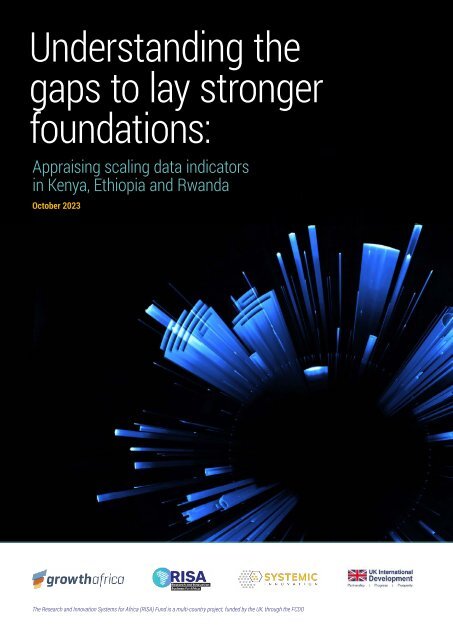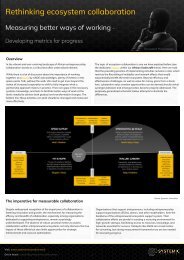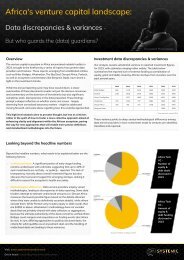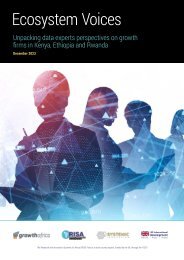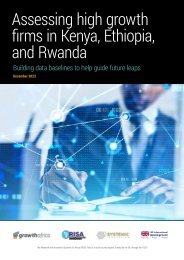Understanding the gaps to lay stronger foundations.
Appraising scaling data indicators in Kenya, Ethiopia and Rwanda. In this report, we highlight key elements of a data supply audit undertaken to determine what data exists that is relevant to scaling ventures in Kenya, Ethiopia and Rwanda. The findings inform the co-design and co-development of country-level data collaboratives to support ventures and ecosystem stakeholders by identifying, collating and diffusing relevant data and insights on scaling in the three countries.
Appraising scaling data indicators in Kenya, Ethiopia and Rwanda. In this report, we highlight key elements of a data supply audit undertaken to determine what data exists that is relevant to scaling ventures in Kenya, Ethiopia and Rwanda. The findings inform the co-design and co-development of country-level data collaboratives to support ventures and ecosystem stakeholders by identifying, collating and diffusing relevant data and insights on scaling in the three countries.
Create successful ePaper yourself
Turn your PDF publications into a flip-book with our unique Google optimized e-Paper software.
<strong>Understanding</strong> <strong>the</strong><br />
<strong>gaps</strong> <strong>to</strong> <strong>lay</strong> <strong>stronger</strong><br />
<strong>foundations</strong>:<br />
Appraising scaling data indica<strong>to</strong>rs<br />
in Kenya, Ethiopia and Rwanda<br />
Oc<strong>to</strong>ber 2023<br />
The Research and Innovation Systems for Africa (RISA) Fund is a multi-country project, funded by <strong>the</strong> UK, through <strong>the</strong> FCDO
Contents<br />
Public (government / non profit)<br />
Regional insights<br />
Private sec<strong>to</strong>r suppliers<br />
4<br />
Our data audit methodology 5<br />
Kenya snapshot 5<br />
Rwanda snapshot 7<br />
Data hidden behind paywalls<br />
limiting full assessment<br />
Ethiopia snapshot 8<br />
A pragmatic way forward <strong>to</strong> support scaling ventures 9<br />
In this report, we highlight key elements of a data supply audit undertaken<br />
<strong>to</strong> determine what data exists that is relevant <strong>to</strong> scaling ventures in Kenya,<br />
Ethiopia and Rwanda. The findings inform <strong>the</strong> co-design and co-development<br />
of country-level data collaboratives <strong>to</strong> support ventures and ecosystem<br />
stakeholders by identifying, collating and diffusing relevant data and insights on<br />
scaling in <strong>the</strong> three countries.<br />
This insight report is <strong>the</strong> second of a series produced by GrowthAfrica and<br />
Systemic Innovation under a FCDO-funded Research and Innovation Systems<br />
for Africa (RISA) Fund project <strong>to</strong> conceptualise, design and launch a scalable<br />
and replicable model for a data observa<strong>to</strong>ry for scaling commercial ventures in<br />
Kenya, Ethiopia and Rwanda.<br />
Data Supply Mapping<br />
Public (government / non profit)<br />
Private sec<strong>to</strong>r suppliers<br />
Data hidden behind paywalls limiting full assessment<br />
Graphic 1: A selection of data sources considered that are focused on entrepreneurship growth, investment, and ecosystem conditions.
PAGE. 3<br />
<strong>Understanding</strong> <strong>the</strong><br />
<strong>gaps</strong> <strong>to</strong> <strong>lay</strong> <strong>stronger</strong><br />
<strong>foundations</strong><br />
Insight report<br />
No. 2<br />
Regional insights<br />
Contextual barriers<br />
• Varying levels of investment and ecosystem development across <strong>the</strong> countries create<br />
challenges for a uniform design process.<br />
• The majority of firms in <strong>the</strong> examined countries are micro or small enterprises, with only a<br />
small fraction considered scaling or high-growth ventures.<br />
• Kenya has a significantly higher ecosystem value compared <strong>to</strong> Ethiopia and Rwanda<br />
(see graphics below).<br />
Data challenges<br />
• Scarcity of formal quantitative research on scaling and high-growth firms in East Africa.<br />
• Limited availability of public data on scalability metrics and firm capability dynamics.<br />
• Lack of longitudinal research on sustained growth and fac<strong>to</strong>r dynamics.<br />
• National statistics offices have insufficient detailed firm-level data.<br />
• Reluctance among academics and researchers <strong>to</strong> share data, leading <strong>to</strong> data recycling and<br />
limited surveys.<br />
• Limited access <strong>to</strong> ventures’ internal KPI data.<br />
Gaps in data<br />
• Limited research on <strong>the</strong> “how” and “why” of scaling firms, relying instead on investment<br />
data as a proxy for scaling intelligence.<br />
• Data <strong>gaps</strong> in understanding <strong>the</strong> growth and sustainability of startups in <strong>the</strong> examined<br />
countries.<br />
• Absence of publicly available firm-level benchmarking data, hindering comparative<br />
assessments.<br />
• Limited demand-side data from scaling founders regarding <strong>the</strong>ir specific needs.<br />
• Existing platforms focus on macro-level fac<strong>to</strong>rs and have limited practical use for<br />
benchmarking scaling and high-growth firms.<br />
Conceptual challenges<br />
• Methodological challenges in measuring ecosystems, defining what <strong>to</strong> measure and how.<br />
• Lack of clear taxonomies for understanding scale and high growth.<br />
• Difficulty in predicting scaling and high growth firms due <strong>to</strong> heterogeneous characteristics<br />
and <strong>the</strong> random nature of growth.<br />
• No consistent set of underlying features of scaling and high-growth firms across different<br />
settings.<br />
• Lack of distinction between different types of growth firms in East Africa’s research and<br />
data initiatives.<br />
• Few data collaboratives exist in East Africa, and none for entrepreneurship.<br />
Measurement and evaluation challenges<br />
• Insufficient M&E data for assessing <strong>the</strong> effectiveness of ecosystem interventions.<br />
• Importance of intelligence on capabilities and behaviours for understanding growth<br />
strategies and challenges.<br />
• Gaps and inconsistencies in investment deal data.<br />
• Patchy ecosystem data with varying definitions of “strong” conditions.<br />
• Established ecosystem health indica<strong>to</strong>rs, but data <strong>gaps</strong> and accessibility issues remain.<br />
• Existing macro ecosystem indica<strong>to</strong>rs do not cater <strong>to</strong> <strong>the</strong> needs of micro firms.
PAGE. 4<br />
<strong>Understanding</strong> <strong>the</strong><br />
<strong>gaps</strong> <strong>to</strong> <strong>lay</strong> <strong>stronger</strong><br />
<strong>foundations</strong><br />
Graphics 2, 3, 4:<br />
Equity investment in<strong>to</strong> 1) Kenyan, 2) Ethiopian and 3) Rwandan companies by year, and deal size -<br />
overall ecosystem “value” is significantly skewed <strong>to</strong>ward Kenya<br />
Insight report<br />
No. 2<br />
$100.0-250m<br />
$0-1.0m (pre-seed)<br />
$1.0-4.0m (seed) $4.0-15.0m (series A) $15.0-40.0m (series B) $40.0-100.0m (series C)<br />
$250m+<br />
Kenya<br />
$1.0b<br />
$800m<br />
$600m<br />
$400m<br />
$200m<br />
$0m<br />
2010<br />
2012 2014 2016 2018 2020 2022*<br />
$30m<br />
Ethiopia<br />
$20m<br />
$10m<br />
$0m<br />
2011 2012 2013 2014 2015 2016 2017 2018 2019 2020 2021 2022* 2023YTD*<br />
Rwanda<br />
$8m<br />
$6m<br />
$4m<br />
$2m<br />
$0<br />
2012 2013 2014 2015 2016 2017 2018 2019 2020 2021 2022* 2023YTD*<br />
Equity investment in<strong>to</strong> 1) Kenyan, 2) Ethiopian and 3) Rwandan companies by year, and deal size - overall ecosystem “value” is significantly<br />
skewed <strong>to</strong>ward Kenya (Source: Dealroom, 2023)
PAGE. 5<br />
<strong>Understanding</strong> <strong>the</strong><br />
<strong>gaps</strong> <strong>to</strong> <strong>lay</strong> <strong>stronger</strong><br />
<strong>foundations</strong><br />
Insight report<br />
No. 2<br />
Our data audit methodology<br />
• Desk<strong>to</strong>p research: We conducted a comprehensive review of key data sources, including<br />
public and private databases, and conducted an extensive literature review of academic<br />
studies. We analysed and ranked 319 articles and reports (169 for Kenya, 57 for Rwanda,<br />
93 for Ethiopia) based on <strong>the</strong>ir relevance <strong>to</strong> our investigation. We also explored relevant<br />
data platforms and open data processes and policies in each country.<br />
• Stakeholder interviews: We conducted targeted semi-structured discussions with various<br />
stakeholders in <strong>the</strong> ecosystem <strong>to</strong> validate and enhance our research findings.<br />
• Syn<strong>the</strong>sis/ analysis: Based on our research and data discovery process, we examined <strong>the</strong><br />
available data, identified <strong>gaps</strong>, and analysed <strong>the</strong>ir implications.
PAGE. 6<br />
<strong>Understanding</strong> <strong>the</strong><br />
<strong>gaps</strong> <strong>to</strong> <strong>lay</strong> <strong>stronger</strong><br />
<strong>foundations</strong><br />
Insight report<br />
No. 2<br />
Kenya snapshot<br />
Despite being <strong>the</strong> biggest and most mature of <strong>the</strong> three ecosystems, <strong>the</strong>re is<br />
limited research and data targeting scaling and high-growth firms. A recent UK<br />
Government report highlighted how <strong>the</strong> ecosystem suffers because of <strong>the</strong> lack of<br />
accurate, high-quality data. Our review of academic journals also found very limited<br />
analysis of scaling dynamics.<br />
Insights<br />
→ The influence of psychological traits such as control, risk appetite, motivation, and<br />
traditional dimensions like managerial skills, entrepreneurship experience, education, gender,<br />
age and self-efficacy is missing from existing data and research.<br />
→ Firm-level characteristics in Kenya do not consider <strong>the</strong> impact of engagement in export<br />
activities and ownership structure (especially foreign ownership) on performance and<br />
growth.<br />
→ There is limited focus on agglomeration effects (i.e. economic benefits derived from <strong>the</strong><br />
clustering of economic activity), while broader ecosystem attributes such as access <strong>to</strong><br />
capital, networks/ linkages, regula<strong>to</strong>ry frameworks, policies and infrastructure receive<br />
significant attention.<br />
→ Studies examining <strong>the</strong> influence of business systems and processes related <strong>to</strong> <strong>the</strong> transition<br />
from startup <strong>to</strong> enterprise and <strong>the</strong> organisational dynamics of rapid growth are lacking.<br />
→ The categorisation of scaling and high-growth firms in Kenya is challenging due <strong>to</strong> limited<br />
recognition by <strong>the</strong> government and unclear classification parameters, which hinders<br />
understanding of how and why successful scaling occurs.<br />
→ Research on gazelles (i.e. scaling firms with 20% year-on-year growth) and <strong>the</strong> concept of<br />
scaling has received limited attention from academics and is often used interchangeably<br />
with firm performance.<br />
→ The absence of <strong>the</strong>oretical models or empirical tests explaining <strong>the</strong> success of scaling and<br />
high-growth firms in Kenya fur<strong>the</strong>r limits understanding in this area.<br />
Spotlight: FCDO Ecosystem Assessment highlights data holes<br />
In March 2023, Maitri Capital published an ecosystem assessment report and series of<br />
case studies commissioned by <strong>the</strong> UK Government’s FCDO which identified a series of<br />
<strong>gaps</strong> and challenges:<br />
→ The ecosystem suffers from insufficient research due <strong>to</strong> <strong>the</strong> lack of accurate and<br />
quality data, which often forces stakeholders <strong>to</strong> rely on bias or extrapolation-based<br />
data.<br />
→ Data deficiency represents a major barrier <strong>to</strong> effective startup and innovation policy<br />
and programme design, impact assessment, and moni<strong>to</strong>ring, evaluation and learning.<br />
→ Various government organisations working in silos with little or no coordination<br />
on activities, programmes or incentives related <strong>to</strong> startups (<strong>the</strong>refore duplicating<br />
activities and services, resulting in wastage of resources).<br />
→ The government faces difficulties defining startups and typically bundles micro and<br />
small businesses with startups.<br />
→ Lack of sufficient recognition or attention <strong>to</strong> startups and <strong>the</strong>ir role as a key economic<br />
driver.<br />
→ Due <strong>to</strong> a lack of sufficient quality data on <strong>the</strong> number of startups and <strong>the</strong> entire<br />
ecosystem, <strong>the</strong> government has found it difficult <strong>to</strong> channel cash <strong>to</strong> help <strong>the</strong> industry.<br />
→ Access <strong>to</strong> information is difficult, as are obsolete and incomplete data sets used in<br />
decision making.
PAGE. 7<br />
<strong>Understanding</strong> <strong>the</strong><br />
<strong>gaps</strong> <strong>to</strong> <strong>lay</strong> <strong>stronger</strong><br />
<strong>foundations</strong><br />
Insight report<br />
No. 2<br />
Rwanda snapshot<br />
Scaling and high-growth firms are largely absent in <strong>the</strong> ecosystem despite<br />
significant Entrepreneur Support Organisations (ESO) support activity. No academic<br />
studies focus on scaling ventures. There are initiatives seeking <strong>to</strong> collect better<br />
measurement and evaluation (M&E) from ESOs.<br />
Insights<br />
→ Limited insights in<strong>to</strong> how firms develop in<strong>to</strong> enterprises and scale outside <strong>the</strong> country. Data<br />
availability is scarce, and <strong>the</strong> pool of observable growth firms is small, mainly comprising<br />
corporations with ties <strong>to</strong> <strong>the</strong> government.<br />
→ Lack of detailed profiles of successful scaling and high-growth firms. Most literature<br />
focuses on surveys of SMEs, with limited examination of individual founder profiles and<br />
longitudinal data.<br />
→ Some case studies on large firms, such as SINA Gerard Urwibutso and Braliwa Ltd., offering<br />
insights in<strong>to</strong> <strong>the</strong>ir operations and internal dynamics.<br />
→ Emphasis on challenges faced by larger firms, including innovation constraints, au<strong>to</strong>cratic<br />
management, relationship-based hiring, and limited employee involvement.<br />
→ Commonly-cited fac<strong>to</strong>rs hindering SME growth include skills <strong>gaps</strong>, fear of failure, risk<br />
aversion, lack of self-confidence, limited innovation and managerial skills, and inadequate<br />
human resource management.<br />
→ Most Rwandan enterprises lack <strong>the</strong> scale economies necessary for competitiveness, as<br />
highlighted in <strong>the</strong> IFC private sec<strong>to</strong>r diagnostics report.<br />
→ Limited sec<strong>to</strong>r-specific literature and definitional clarity for SMEs, with recent studies<br />
starting <strong>to</strong> focus on specialised sec<strong>to</strong>rs.<br />
→ Limited examination of individual entrepreneurial traits, particularly related <strong>to</strong> growth firms.<br />
→ Insufficient evidence on deeper causal fac<strong>to</strong>rs supporting SME growth, despite some<br />
consideration of dynamic firm capabilities.<br />
→ Lack of studies on Rwandan corporations’ entry in<strong>to</strong> regional or global markets and limited<br />
cross-comparative analysis with o<strong>the</strong>r regional markets.<br />
→ Surface-level assessments of positive spillover benefits from SME performance, without<br />
clear identification of impactful governmental policies.<br />
→ Lack of research on women in scaling firms and addressing challenges faced by female<br />
entrepreneurs and youth.
PAGE. 8<br />
<strong>Understanding</strong> <strong>the</strong><br />
<strong>gaps</strong> <strong>to</strong> <strong>lay</strong> <strong>stronger</strong><br />
<strong>foundations</strong><br />
Insight report<br />
No. 2<br />
Ethiopia snapshot<br />
Many key public and private data variables are nei<strong>the</strong>r collected nor available. The<br />
entrepreneurial ecosystem is very nascent, but developing. There has been very<br />
limited evaluation and measurement focus from ESOs. Few academic studies or<br />
grey literature exists on scaling ventures.<br />
Insights<br />
→ Access <strong>to</strong> credit is a significant concern for SMEs, as <strong>the</strong>y face challenges in obtaining loans<br />
from both microfinance institutions and formal banks, reflecting <strong>the</strong> absence of “missing<br />
middle” financial intermediaries that cater <strong>to</strong> small enterprises.<br />
→ Tax rates are perceived as an obstacle for scaling and high-growth firms.<br />
→ ESO programmes in Ethiopia do not prioritise innovative and competitive firms when<br />
allocating resources.<br />
→ Studies indicate that firm growth tends <strong>to</strong> decrease with size, with smaller firms exhibiting<br />
faster growth rates, despite higher attrition rates.<br />
→ Limited his<strong>to</strong>rical research exists on entrepreneurship and gender in Ethiopia, but indications<br />
suggest that female-owned firms have registered relatively lower growth rates compared <strong>to</strong><br />
<strong>the</strong>ir male counterparts.<br />
→ Large firms account for 97 percent of new job creation, and incumbents p<strong>lay</strong> a more<br />
significant role in generating employment than new entrants. Fac<strong>to</strong>rs such as agglomeration<br />
economics, a favourable business environment, and access <strong>to</strong> infrastructure vary in <strong>the</strong>ir<br />
impact depending on <strong>the</strong> firm’s size, life cycle, and growth rate.<br />
→ Various challenges - including financial, political, legal, and technological fac<strong>to</strong>rs - impede<br />
<strong>the</strong> growth and sustainability of firms. Although many studies focus on micro firms, <strong>the</strong>se<br />
underlying challenges are common and significant determinants of firm growth.<br />
→ Ethiopia’s complex business environment and regula<strong>to</strong>ry framework pose difficulties for<br />
East African inves<strong>to</strong>rs seeking <strong>to</strong> navigate <strong>the</strong> market and find investment opportunities.<br />
The early stage of <strong>the</strong> private sec<strong>to</strong>r and <strong>the</strong> lack of mature businesses fur<strong>the</strong>r limit <strong>the</strong><br />
inves<strong>to</strong>r pipeline.<br />
→ Internal enterprise fac<strong>to</strong>rs (such as firm size, employees’ education level, managers’<br />
technology adoption capability, on-job training, and research and development<br />
expenditures) have a positive impact on both types of innovations. Private and foreign<br />
ownership were found <strong>to</strong> be significant only for process innovation.
PAGE. 9<br />
<strong>Understanding</strong> <strong>the</strong><br />
<strong>gaps</strong> <strong>to</strong> <strong>lay</strong> <strong>stronger</strong><br />
<strong>foundations</strong><br />
Insight report<br />
No. 2<br />
A pragmatic way forward<br />
<strong>to</strong> support scaling ventures<br />
Capturing and processing a vast array of entrepreneurial ecosystem data and datasets is<br />
beyond <strong>the</strong> scope of our project. Instead, our focus is on <strong>the</strong> specific data needs of scaling<br />
ventures during <strong>the</strong>ir scaling journey.<br />
Our data collaborative effort aims <strong>to</strong> identify, compile and share relevant data on scaling<br />
ventures in <strong>the</strong> three countries. We acknowledge that ESOs are well-positioned <strong>to</strong> ga<strong>the</strong>r and<br />
utilise data, as <strong>the</strong>y already provide direct support <strong>to</strong> ventures and ecosystem stakeholders.<br />
Our approach involves exploring a narrow set of firm-level data, in addition <strong>to</strong> ESO datasets, <strong>to</strong><br />
inform our future direction. We anticipate partnering with select organisations specialising in<br />
venture and ecosystem data. We are leveraging existing activities and investments <strong>to</strong> ensure<br />
sustainability and maximise long-term benefits.<br />
Ecosystem recommendations<br />
1. Enhance coordination among key public agencies at national and international (donor)<br />
levels <strong>to</strong> improve coherence and efficiency, reducing duplication and maximising value<br />
for money.<br />
2. Increase academic research specifically targeting scaling and high-growth firms,<br />
including in-depth longitudinal case studies <strong>to</strong> understand <strong>the</strong> unique dynamics and<br />
evolution of scaling across different types of growth firms.<br />
3. Implement scale diagnostics <strong>to</strong> assess key organisational dynamics and identify<br />
barriers hindering growth trajec<strong>to</strong>ries, enabling a better understanding of growth<br />
impediments.<br />
4. Integrate scaling data with impact reporting <strong>to</strong> ensure that growth has positive<br />
spillover benefits and contributes <strong>to</strong> broader societal impacts.<br />
5. Effectively disseminate ecosystem knowledge <strong>to</strong> ensure a better understanding of<br />
scaling beyond mere investment raising, facilitating a more nuanced evaluation of<br />
growth processes.<br />
6. Address ecosystem fatigue by promoting improved coordination, resulting in increased<br />
efficiency and resource optimisation within <strong>the</strong> ecosystem.<br />
7. The World Bank has made a call <strong>to</strong> action <strong>to</strong> national statistical agencies, donors and<br />
international organisations <strong>to</strong> make high-quality firm data a priority. If we agree that<br />
ecosystem productivity is what matters in <strong>the</strong> long run, efforts should be more serious<br />
and intentional about measuring it.<br />
For fur<strong>the</strong>r information, please contact us at contact@systemicinnovation.work


